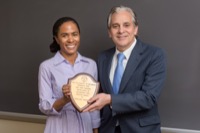Native Delaware: Service award
Master Gardeners help others discover uplifting benefits of nature
10:35 a.m., Nov. 1, 2012--When Terry Tse was growing up in Hong Kong, her bedroom was always full of plants. Living in the midst of this exciting yet chaotic city, Tse knew that plants brought tranquility.
“Flowers make you calm,” she says.
Honors Stories
National Medal of Science
Warren Award
Today, Tse is helping clients of the Delaware Psychiatric Center discover the uplifting benefits of nature. She and fellow University of Delaware Master Gardeners assisted in the development of a therapeutic garden at the center two years ago.
The project has grown to include a sensory garden for the visually impaired and a farmer’s market that sells produce fresh from the garden. And that’s just some of what was accomplished at the Department of Health and Social Services New Castle campus. Plus, the Master Gardeners helped to establish a garden at the Delaware School for the Deaf in Newark.
For their efforts, this Master Gardener team received a Governor’s Outstanding Service Award at a ceremony held this past Thursday. In addition to Tse, recipients included Fred Hillegas, Mary Ellen Hillegas, Bill Horne and Carmela Simons. Duane Ashley, who is not a Master Gardener but was an active project volunteer, also shared in the award.
“The Master Gardeners were immediately interested in this project and the potential that these gardens had to impact the clients and staff at these sites,” says Carrie Murphy, horticultural agent for New Castle County Cooperative Extension. “They provided both technical expertise and educational programming. They presented workshops for clients and staff on topics like composting, identifying garden pests and how to enjoy a sensory garden.”
The Master Gardeners also rolled up their sleeves and got their hands dirty. Bill Horne offered his creative skills for the therapeutic garden’s design but he also pulled weeds and harvested vegetables. Mary Ellen and Fred Hillegas helped the center’s clients run the farmer’s market on Fridays, and when they couldn’t make it, Tse filled in. In the last two years, the market sold 1,693 pounds of produce and what wasn’t sold – 525 pounds in all – was donated to the Food Bank of Delaware.
From the get-go, the Master Gardeners knew that they wanted these projects to be driven by the needs and desires of the clients. At the Delaware Psychiatric Center, a residential client named Jack wanted popping corn in the vegetable garden. Others requested tomatoes, pumpkins, sweet corn and peppers. Clients also helped with the selection of ornamentals. One individual fondly recalled lilac from a childhood home so the Master Gardeners included a lilac bush in the garden design.
As for the sensory garden, it’s a feast of sounds, fragrances and textures, as well as sights. In winter, switchgrass rustles in the wind. In spring, the velvety leaves of lamb’s ear plant beg to be touched. Come summer, the earthy smell of basil entices. And in fall, black seedpods of baptisia rattle loudly at the slightest shake.
Some of the clients who come to the Division of Visually Impaired’s New Castle office for vocational rehab or independent living services are in wheelchairs or have other physical limitations. So the Master Gardeners designed wider pathways to allow for wheelchair access, and many of the beds are raised and feature a grid pattern.
“With a grid pattern, a blind or visually impaired person can, for example, count two squares down and three over and know they’ve found the mint that they wanted to pick,” notes Horne.
The vegetable garden at the Delaware School for the Deaf was installed last November. Tied into grade-level curricula, the garden promotes healthy eating habits and new vocational options.
Mary Ellen Hillegas, who was a counselor at the school before retirement, says the garden also serves an important social function. “Ten to 12 students will be in the garden at any given time and they’ll need to come to consensus on planning tasks and sharing tools and other cooperative behavior,” she says. “The garden has tremendous possibilities as a teaching tool.”
Organizations that collaborated with the Master Gardeners include UD’s Center for Disabilities Studies, Delaware Center for Horticulture, the National Alliance on Mental Illness and Delaware Department of Agriculture. For the school garden, the nonprofit group Healthy Foods for Healthy Kids partnered with the Master Gardeners.
Delaware Department of Agriculture staffer Faith Kuehn spearheaded the therapeutic garden projects and she nominated the Master Gardeners for the Governor’s Outstanding Service Award.
“What impresses me most about these Master Gardeners is that it comes from the heart,” says Kuehn. “They aren’t doing it for the volunteer hours or the recognition. They really want to make a difference.”
Jack, who grew his own popping corn this summer, and other individuals who have benefited from the gardens, would say that the Master Gardeners are doing exactly that.
Article by Margo McDonough








